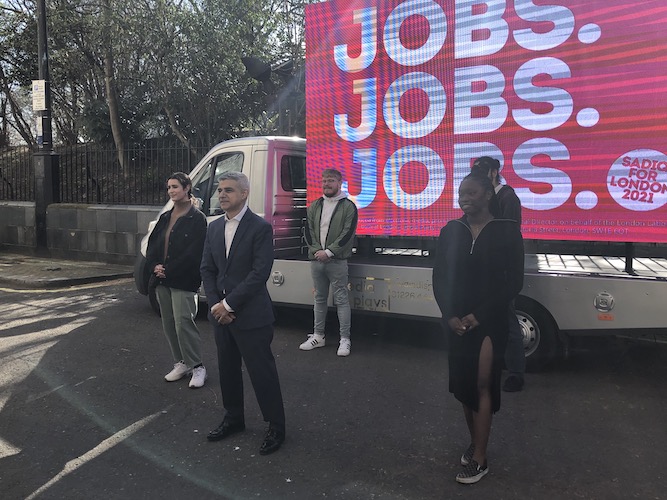Sadiq Khan has promised to invest £32 million in four “new training academies” to help Londoners secure jobs in sectors that are expected to expand in the future and escape any long-term damage to other parts of the capital’s economy inflicted by the pandemic.
With the capital in the grip of the highest unemployment rate in the country at seven per cent and an estimated 300,000 Londoners out of work, equipping people for green and low carbon, creative, digital and health and social care employment will be the focus of what the Mayor calls his “good work fund” if re-elected on 6 May.
Announcing the scheme this morning at Savoy Place, Khan explained that it will be modelled on the existing Mayor’s Construction Academy, seven locality-based “hubs” helping people find the skills training they need and alerting employers to potential employees.
Khan told reporters that he “lived through the 1980s and saw the impact of mass unemployment”. He reaffirmed that “my mission should I be re-elected is to protect jobs and to support job creation and help those who’ve lost their jobs get back into work” and said he feared the scale of job losses could get worse when the government’s furlough scheme ends in September.
The decision to concentre funds on these four areas is partly informed by uncertainty about the speed and strength of the recovery of Central London’s economy, with its large retail, hospitality and cultural attractions, which are heavily reliant on visitors.
The Mayor has already put £6 million into promoting what he hopes will be a strong revival of the West End later this year, with a combination of good weather, restrictions on foreign holidays and a series of events over the summer creating a surge in domestic visitors and “Londoners reminding ourselves why we love this city”.
However, he warned that many of those Central London jobs “could be lost if there isn’t a rapid recovery. That’s why we’ve got to pivot towards those sectors where there are futureproof, well-paid good jobs.” And he declared his disappointment that the government hasn’t matched the £6 million: “My concern is if you want a national recovery you must have a London recovery. By not investing in London you’re doing damage to the national recovery.”
Khan added that improving job opportunities is important for preventing young Londoners from drifting into crime. “Jobs training and creating jobs in growth sectors is one way to get young people doing constructive things, to be law abiding and peaceful,” he said.
Asked by On London if he expects London’s population to fall as the result of the pandemic, Khan said, “I know from personal experience as well as from speaking to employers that people have left London.” With workplaces closed and an opportunity to save on rent, “They might have gone back to mum and dad in Manchester or Burnley or Bradford or they may have gone back to their country of origin”.
Khan said he hopes it is “a boomerang migration and they’ll come back once the jobs come back” but knows from construction companies that, in their case, workers originally from eastern Europe who returned home for Christmas or summer who normally “come back and bring people with them to work on building sites” were not expected to return this time. Khan added: “I’m extremely concerned about the impact of Brexit on some sectors. You’re also seeing record vacancies in health and social care.”
Estimates of the pandemic’s impact have ranged from projections of London’s population continuing to rise, albeit at an initially reduced rate, to a calculation that it has abruptly fallen by a possibly temporary 700,000, which has in turn been challenged as a likely large overstatement.
Khan has been urging EU citizens to apply to the UK’s EU settlement scheme by the deadline of 30 June, as failing to do so could leave them unable to return to the UK if they don’t meet the requirements of the Home Office’s new points-based system. Some may have pre-settled status, conferred on successful applicants who haven’t lived in the UK for five continuous years, but “they’re not sure what they means” and are uncertain about coming back to London.
Addressing worries that London-born Londoners wouldn’t take up lower skilled jobs in sectors where there might be future labour shortages Khan said “nobody knows” what might transpire, but said there might be a need to improve wages or for the Home Secretary to “give some flexibility” to Mayors across the regions to adjust immigration criteria so that vacancies can be filled.
He described this as a “far more sensible” approach then leaving it the central government civil servants and said the situation in London will become clearer later in the year. “This summer we’ll know more, because we’ll see whether in jobs in hospitality and so on will be filled or vacant.”
OnLondon.co.uk provides in-depth coverage of the UK capital’s politics, development and culture. It depends greatly on donations from readers. Give £5 a month or £50 a year and you will receive the On London Extra Thursday email, which rounds up London news, views and information from a wide range of sources, plus special offers and free access to events. Click here to donate directly or contact davehillonlondon@gmail.com for bank account details.

